Steps to Take if Hired Despite a Failed Drug Test

Steps to Take if Hired Despite a Failed Drug Test
Pre-employment drug testing is a critical component of the hiring process for many employers. These tests are designed to ensure a safe, productive, and compliant workplace by screening candidates for substance use. While a failed drug test may seem like a deal-breaker for job applicants, there are scenarios where individuals can still be hired despite unfavorable results. Understanding the nuances of pre-employment drug testing can help job seekers and employers navigate this complex process with confidence.
This section will delve into the purpose of pre-employment drug tests, the types of tests commonly used, the substances screened, and the implications of failing these tests. By the end, you’ll have a clear understanding of why employers prioritize drug testing and how it impacts hiring decisions.
What Is a Pre-Employment Drug Test?
A pre-employment drug test is a screening process used by employers to detect the presence of drugs or alcohol in a job applicant’s system. These tests are typically conducted as part of the final stages of the hiring process and are often a condition of employment. Drug testing helps employers verify that candidates meet company policies and industry regulations related to substance use.
The Purpose of Pre-Employment Drug Testing
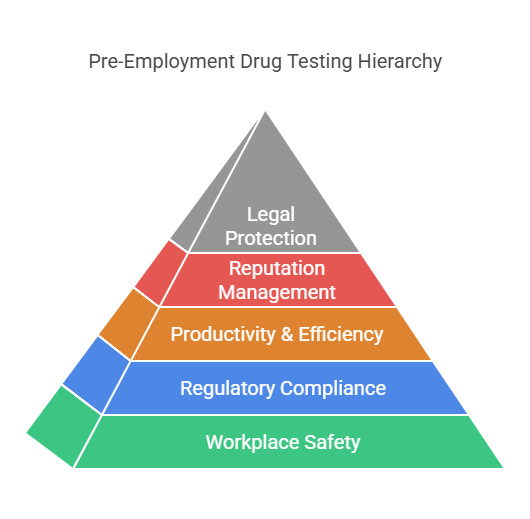
Employers use pre-employment drug testing for several key reasons:
- Workplace Safety: In industries where safety is critical—such as transportation, healthcare, and construction—drug use can lead to accidents, injuries, or even fatalities. Testing helps mitigate these risks by ensuring employees are sober and capable of performing their duties.
- Regulatory Compliance: Many industries are subject to federal or state regulations that require drug testing as a condition of employment. For example, the Department of Transportation (DOT) mandates drug and alcohol testing for roles involving commercial vehicle operation.
- Productivity and Efficiency: Substance abuse can negatively impact employee performance, leading to absenteeism, decreased productivity, and high turnover rates. By screening candidates, employers aim to maintain a productive workforce.
- Reputation Management: Hiring employees who misuse substances can tarnish a company’s reputation, especially if incidents related to drug use become public knowledge. Drug testing helps safeguard a company’s image.
- Legal Protection: Conducting drug tests provides employers with a legal safeguard in case of workplace incidents or disputes related to substance use.
Common Types of Pre-Employment Drug Tests
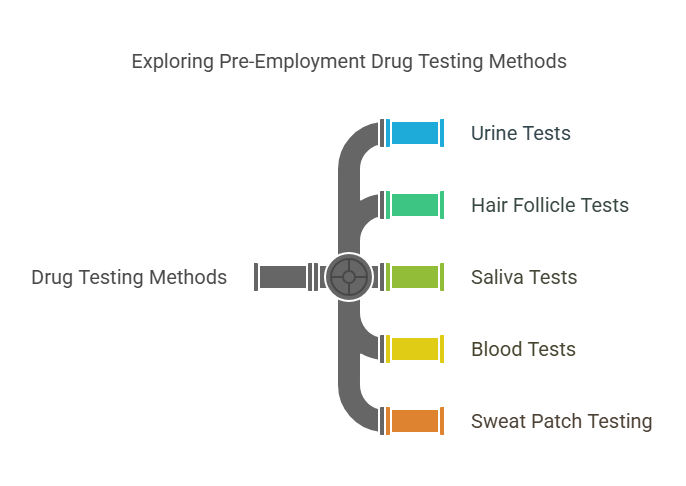
Employers can choose from various drug testing methods, depending on their needs and budget. Here are the most common types:
1. Urine Tests
- Overview: The most widely used method, urine tests are cost-effective and reliable.
- Detection Window: Typically detects drug use within the past 3–30 days, depending on the substance.
- Substances Detected: Marijuana, cocaine, amphetamines, opioids, and more.
2. Hair Follicle Tests
- Overview: This method analyzes hair samples to detect drug use over a longer period.
- Detection Window: Can identify drug use up to 90 days prior.
- Advantages: Provides a broader view of an applicant’s substance use history.
- Disadvantages: Higher cost and less effective for detecting recent drug use.
3. Saliva Tests
- Overview: Saliva tests are non-invasive and easy to administer.
- Detection Window: Typically detects drug use within 24–48 hours.
- Ideal For: Employers seeking immediate insights into recent drug use.
4. Blood Tests
- Overview: Blood tests are highly accurate but less commonly used due to their invasive nature.
- Detection Window: Detects substances currently in the bloodstream, providing a snapshot of immediate use.
- Usage: Often reserved for specific situations, such as post-accident investigations.
5. Sweat Patch Testing
- Overview: This involves wearing a patch on the skin for several days to monitor ongoing drug use.
- Detection Window: Continuous detection during the wearing period.
- Applications: Less common but useful for monitoring individuals in recovery programs.
Substances Typically Screened in Pre-Employment Drug Tests
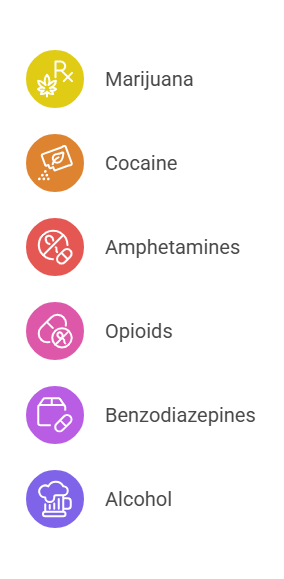
Most employers use a standard panel to test for common substances. The substances screened may vary depending on the job role and industry, but they often include the following:
- Marijuana (THC): The most commonly detected substance, especially in states where it is still illegal for recreational or medicinal use.
- Cocaine: A stimulant that poses significant safety risks in the workplace.
- Amphetamines and Methamphetamines: Often tested for due to their potential for abuse and impact on cognitive function.
- Opioids: Includes both prescription painkillers and illicit drugs like heroin.
- Benzodiazepines: Commonly prescribed for anxiety but often misused.
- Alcohol: Although not always included in standard tests, alcohol screening is critical for safety-sensitive roles.
Industries Where Pre-Employment Drug Testing Is Most Common
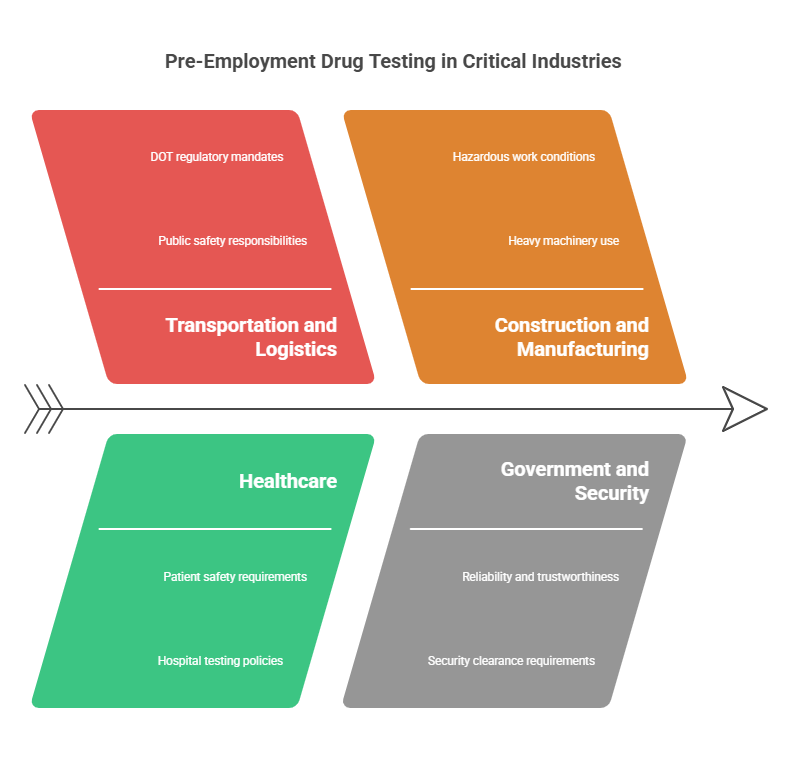
While drug testing is widespread across many industries, it is particularly prevalent in sectors where safety and compliance are non-negotiable. These industries include:
1. Transportation and Logistics
- Why It’s Critical: Drivers, pilots, and other transportation professionals are responsible for public safety.
- Regulatory Mandates: The DOT enforces strict drug and alcohol testing requirements.
2. Healthcare
- Why It’s Critical: Healthcare workers must provide safe and effective care to patients.
- Testing Requirements: Many hospitals and clinics require drug tests for nurses, doctors, and support staff.
3. Construction and Manufacturing
- Why It’s Critical: These industries involve heavy machinery and hazardous conditions.
- Focus: Employers prioritize drug testing to minimize workplace accidents.
4. Government and Security
- Why It’s Critical: Employees with access to sensitive information or critical infrastructure must be reliable and trustworthy.
- Security Clearance: Drug testing is often a prerequisite for obtaining clearance.
5. Education
- Why It’s Critical: Teachers and school staff are entrusted with the care and development of children.
- Common Practice: Many school districts require drug tests for new hires.
Implications of Failing a Pre-Employment Drug Test
Failing a pre-employment drug test can have several consequences, including:
- Disqualification from the Role: Many employers have zero-tolerance policies, particularly for safety-sensitive positions.
- Impact on Future Applications: A failed test might raise concerns with future employers, especially in the same industry.
- Conditional Offers: Some employers may offer conditional employment, requiring candidates to complete rehabilitation or agree to periodic drug testing.
- Legal Ramifications: In regulated industries, failing a drug test could result in losing certifications or licenses.
Statistics on Pre-Employment Drug Testing
Recent data sheds light on the prevalence and outcomes of pre-employment drug testing:
- 62% of employers in the United States conduct drug testing as part of their hiring process.
- 4.4% of applicants fail drug tests annually, with marijuana being the most common substance detected.
- 90% of Fortune 500 companies include drug testing in their pre-employment screening programs.
Introduction: Is a Failed Drug Test the End of the Road?
Failing a pre-employment drug test can be a daunting experience for job applicants, often raising concerns about missed opportunities and tarnished reputations. However, failing a drug test doesn’t always mean you’re out of the running for the job. In fact, some employers are willing to consider applicants who fail their drug test under specific circumstances.
In this section, we’ll explore scenarios where a failed pre-employment drug test might not disqualify you from employment, discuss the factors employers consider, and highlight how company policies, industry standards, and individual accountability can influence hiring decisions.
Scenarios Where Employers May Hire After a Failed Drug Test
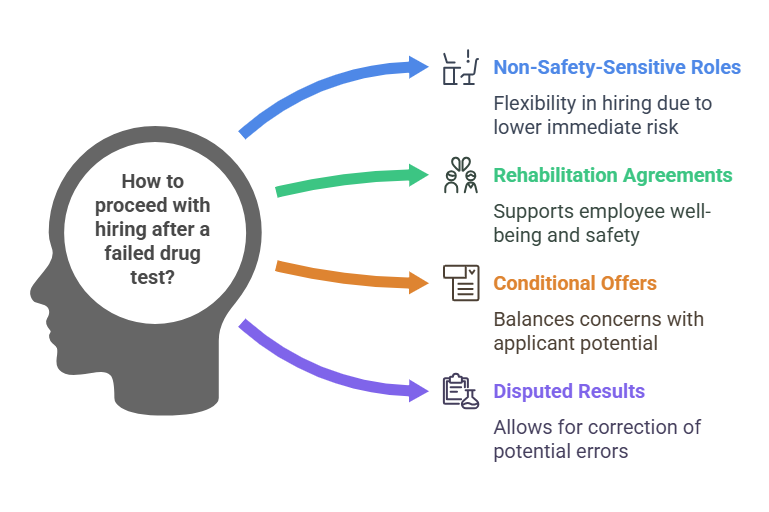
1. Non-Safety-Sensitive Roles
In roles that are not safety-sensitive, employers may exercise greater flexibility when dealing with a failed drug test. Unlike positions in transportation or healthcare, non-safety-sensitive roles may not pose immediate risks to others if an employee has a history of substance use.
- Examples: Office administration, customer service, or remote work positions.
- Why It Matters: Employers in these fields may prioritize skills and experience over a single failed test, especially if the substance detected is legal in the state for recreational or medicinal use.
2. Rehabilitation Agreements
Employers committed to fostering a supportive work environment may offer candidates the opportunity to complete a rehabilitation program as a condition of employment.
- How It Works: Applicants agree to participate in substance abuse counseling or treatment and may need to provide proof of completion before starting the job.
- Why It’s Effective: This approach demonstrates the employer’s willingness to invest in the employee’s well-being while maintaining workplace safety.
3. Conditional Offers of Employment
Some companies provide conditional offers that require additional testing or adherence to strict policies.
- Common Conditions:
- Periodic drug testing over a probationary period.
- Agreement to remain drug-free during employment.
- Flexibility Factor: Employers may use conditional offers to balance concerns about the initial failed test with the applicant’s potential.
4. Disputed Drug Test Results
Occasionally, drug test results may be inaccurate or inconclusive, leading to disputes between the employer and the applicant. In such cases, employers may allow a retest or accept proof that the initial result was incorrect.
- How It’s Handled: Candidates can request a second test from the same sample or provide evidence of prescription medications that could have triggered the result.
- Outcome: If the dispute resolves in favor of the applicant, employers may proceed with the hiring process.
5. Employer Discretion
Some employers are more lenient about drug test results, particularly in industries or regions with less stringent regulations. Factors like labor shortages or a competitive job market may also influence their decisions.
- Industries with Flexibility: Creative fields, technology startups, or roles where drug testing is less common.
- Employer Mindset: Companies may prioritize filling roles quickly over disqualifying candidates for non-critical reasons.
Factors That Influence Employer Decisions
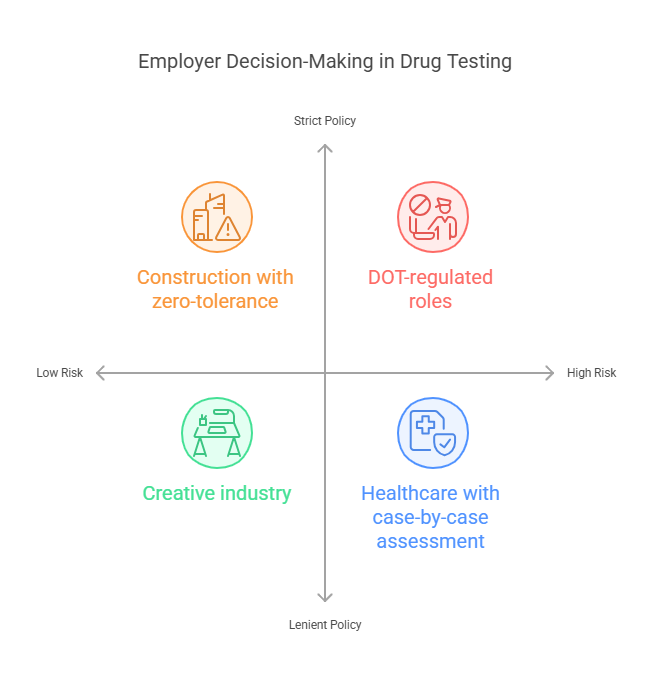
1. Company Policies
Each company has its own drug testing policy, which outlines how it handles positive test results. Policies may include:
- Automatic disqualification.
- Case-by-case assessments based on the substance detected.
- Opportunities for rehabilitation or retesting.
2. State and Federal Laws
State laws significantly impact how employers handle failed drug tests. For example:
- Marijuana Legalization: In states where recreational or medical marijuana use is legal, employers may not disqualify candidates solely for testing positive for THC.
- Regulated Industries: Federal law mandates stricter drug testing standards for roles involving safety-sensitive tasks, such as those regulated by the Department of Transportation (DOT).
3. Severity of Results
Employers may consider the extent of substance use indicated by the test:
- Minor Presence: A trace amount of a substance may be less concerning than a high concentration.
- Substance Type: Illicit drugs like cocaine or heroin are treated more seriously than prescription medications or marijuana (in legal states).
4. Role-Specific Requirements
The nature of the job plays a crucial role in determining how a failed drug test is handled:
- High-Risk Jobs: Positions in construction, aviation, or healthcare often have zero-tolerance policies.
- Low-Risk Jobs: Office-based or creative roles may allow more leniency.
Employer Responses to Failed Drug Tests
Employers respond to failed drug tests in various ways depending on company policy, industry standards, and legal requirements. Below is a comparison of common responses across different scenarios:
| Scenario | Employer Response | Industry Examples |
|---|---|---|
| Safety-sensitive roles | Immediate disqualification | Transportation, healthcare |
| Low-risk positions | Case-by-case evaluation | Office-based, creative industries |
| Legal substances (e.g., marijuana) | Consideration based on state laws | Retail, tech |
| Rehabilitation agreements | Conditional hiring after successful completion of treatment | General industries |
| Inaccurate results | Retesting or accepting proof of prescription drugs | Any |
| Labor shortages | Leniency in disqualifying candidates due to the need for quick hires | Hospitality, retail |
Transparency and Accountability: Keys to Overcoming a Failed Drug Test
1. Honesty With Employers
Transparency can make a significant difference in how employers perceive a failed drug test. Being upfront about past substance use or potential medications that may impact test results can build trust.
- Example Statement: “I want to be transparent that I take a prescribed medication, which may show up on the test.”
- Benefit: Employers are more likely to work with candidates who demonstrate accountability.
2. Proactive Measures
Taking proactive steps can help candidates mitigate the impact of a failed test:
- Rehabilitation: Completing a voluntary program can signal commitment to change.
- Follow-up Tests: Providing clean test results from subsequent screenings demonstrates progress.
3. Demonstrating Value
Candidates who showcase their skills, experience, and professionalism can offset concerns about a failed test.
- Focus on Strengths: Highlight achievements and qualifications during interviews.
- Offer Solutions: Suggest measures like probationary testing or periodic screenings to assure employers of compliance.
The Role of “Exact Background Checks” in Drug Screening
For employers, having access to accurate and timely drug test results is crucial in making informed hiring decisions. Exact Background Checks is a trusted provider of pre-employment screening services, offering:
- Accurate Results: State-of-the-art testing methods ensure reliability.
- Fast Turnaround: Get results quickly, helping employers make timely decisions.
- Compliance Assurance: Services adhere to federal and state laws, protecting both employers and candidates.
Employers can streamline their hiring process and maintain compliance by partnering with Exact Background Checks for all their drug testing needs.
Legal Aspects of Pre-Employment Drug Testing
1. Employer Rights and Responsibilities
Employers have the legal right to conduct pre-employment drug tests as part of their hiring process. However, they must adhere to certain regulations to ensure compliance and fairness:
- Federal Laws: Employers in industries regulated by federal agencies, such as the Department of Transportation (DOT), must follow strict drug testing guidelines.
- State Laws: State-specific laws can influence the legality of drug testing and how results are handled. For instance, some states prohibit disqualifying candidates for testing positive for marijuana if it is legal for medical or recreational use.
- Drug-Free Workplace Policies: Employers must clearly outline their drug testing policies in employee handbooks or job postings to ensure transparency.
2. Applicant Rights and Protections
Job applicants also have legal protections during the drug testing process:
- Informed Consent: Employers are required to obtain written consent from applicants before conducting a drug test.
- Accuracy of Testing: Applicants have the right to dispute inaccurate results, request retesting, or provide documentation for prescribed medications.
- Privacy Laws: Employers must handle drug test results confidentially and share them only with authorized personnel.
3. Fair Credit Reporting Act (FCRA) Compliance
The FCRA governs background checks, including drug testing when conducted by third-party providers. Key requirements include:
- Pre-Adverse Action Notice: If an employer decides not to hire an applicant based on a failed drug test, they must notify the applicant and provide a copy of the test results.
- Dispute Process: Applicants have the right to dispute the results and provide additional evidence.
- Adverse Action Notice: After considering disputes, employers must send a final notice if they decide to withdraw the job offer.
4. Legal Consequences for Non-Compliance
Failing to follow proper drug testing procedures can result in legal challenges, including:
- Discrimination Claims: If drug testing policies disproportionately impact certain groups, employers may face discrimination lawsuits.
- Breach of Privacy: Mishandling test results or failing to maintain confidentiality can lead to legal repercussions.
- Fines and Penalties: Non-compliance with federal or state laws can result in fines, especially for regulated industries.
FAQs About Pre-Employment Drug Testing
Can an employer require both a drug screening test and a background check?
Yes, employers can require both a drug screening test and a background check as part of the hiring process. These screenings serve different purposes: drug tests ensure a drug-free workplace, while background checks verify the applicant’s qualifications and criminal history.
What happens if I fail a drug test but the employer still hires me?
If you fail a drug test and the employer still hires you, there may be conditions attached to your employment, such as:
- Completing a rehabilitation program.
- Undergoing periodic drug testing.
- Signing an agreement to maintain a drug-free status during employment.
Employers may also monitor your performance more closely to ensure compliance.
Are there industries where a failed drug test automatically disqualifies you?
Yes, certain industries have zero-tolerance policies due to the nature of their work. Examples include:
- Transportation: Roles regulated by the DOT, such as truck drivers or pilots.
- Healthcare: Positions involving patient care or access to controlled substances.
- Government and Security: Jobs requiring security clearances or sensitive responsibilities.
How can I prepare for a pre-employment drug test to avoid failing?
To prepare for a drug test:
- Avoid using illegal substances.
- Disclose any prescribed medications to the testing facility.
- Stay hydrated and follow all test instructions.
If you are unsure about potential test results, consider taking an at-home drug test beforehand.
Can a failed drug test affect my future job prospects?
Yes, failing a drug test can impact your future job prospects, especially if the results are shared with other employers or recorded in an industry database. To mitigate long-term effects:
- Be honest about past results during interviews.
- Demonstrate accountability by completing a rehabilitation program or maintaining a clean record in subsequent tests.
Can an employer require both a drug screening test and a background check?
Yes, employers can require both a drug screening test and a background check as part of the hiring process. These screenings serve different purposes: drug tests ensure a drug-free workplace, while background checks verify the applicant’s qualifications and criminal history.
What happens if I fail a drug test but the employer still hires me?
If you fail a drug test and the employer still hires you, there may be conditions attached to your employment, such as:
- Completing a rehabilitation program.
- Undergoing periodic drug testing.
- Signing an agreement to maintain a drug-free status during employment.
Employers may also monitor your performance more closely to ensure compliance.
Are there industries where a failed drug test automatically disqualifies you?
Yes, certain industries have zero-tolerance policies due to the nature of their work. Examples include:
- Transportation: Roles regulated by the DOT, such as truck drivers or pilots.
- Healthcare: Positions involving patient care or access to controlled substances.
- Government and Security: Jobs requiring security clearances or sensitive responsibilities.
How can I prepare for a pre-employment drug test to avoid failing?
To prepare for a drug test:
- Avoid using illegal substances.
- Disclose any prescribed medications to the testing facility.
- Stay hydrated and follow all test instructions.
If you are unsure about potential test results, consider taking an at-home drug test beforehand.
Can a failed drug test affect my future job prospects?
Yes, failing a drug test can impact your future job prospects, especially if the results are shared with other employers or recorded in an industry database. To mitigate long-term effects:
- Be honest about past results during interviews.
- Demonstrate accountability by completing a rehabilitation program or maintaining a clean record in subsequent tests.
Conclusion: Moving Forward After a Failed Drug Test
Failing a pre-employment drug test can be a setback, but it doesn’t have to be the end of your job search. Many employers are willing to consider applicants who demonstrate accountability, transparency, and a commitment to improvement. Factors such as company policies, state laws, and the nature of the role all play a role in determining whether you can still be hired.
For employers, maintaining compliance with drug testing laws and ensuring accurate, fair processes are crucial for making informed hiring decisions. Partnering with reliable services like Exact Background Checks can help streamline pre-employment screenings and provide trustworthy results.
Whether you’re an employer or a job seeker, understanding the legal framework and best practices surrounding drug testing can help you navigate the process confidently. By staying informed and proactive, you can overcome challenges and achieve your employment goals.
